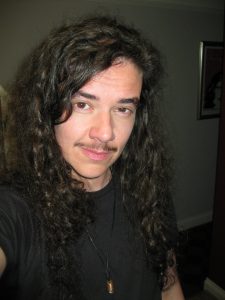 Today, we’re talking with Die Booth about his story for I Didn’t Break the Lamp.
Today, we’re talking with Die Booth about his story for I Didn’t Break the Lamp.
DV: Tell us a bit about yourself!
Die Booth: Hi, I’m James, but I write under the pen name Die Booth, which has been my nickname for as long as I can remember. I live in Chester, England, which is a beautiful city packed with hundreds of ghosts, who I’m always trying to make friends with. When I’m not assembling unsettling stories, I enjoy making other stuff–drawing, sewing, metal, and woodwork. I love goth music and I co-run and DJ at a local goth night.
DV: What inspired you to write “Meltwater” for I Didn’t Break the Lamp?
DB: I keep a folder full of ideas that I write down as they strike me, and then revisit when I’m looking for some inspiration for what to write next. The idea for “Meltwater” came to me a long time ago, after seeing a field full of half-melted snowmen covered in a new layer of snowfall. They looked so menacing, all hunched over and looming, like something out of a zombie film, that I knew I had to write about them. When I saw the excellent pitch for I Didn’t Break the Lamp, I thought back to that story seed and the idea of a snow-creature that only the youngest child could see came to me. I’ve always been very inspired by folklore, and I’ve been getting more into folk horror lately, so the idea of Old Groan really appealed to me. I really like those snippets of folklore where a name alone can induce a feeling of unease.
DV: Your story is a wonderful blend of youthful innocence with something very dark lurking at the edges. Do you find this is a common theme in your writing, or is this unique to this story?
DB: Thank you so much! Yeah, that that’s a common theme of a lot of my work. I think that often, fears are born in childhood. I had an interesting relationship with fear as a child, because I was absolutely fascinated by anything creepy or supernatural, whilst being a bit scared of it too–I think a lot of kids are like that. As I grew older, I always seemed to identify more with the “monster,” and so I like writing stories where the protagonist makes friends with the monster, kind of thing. I write a lot of children and young people in my stories because I think that contrast of innocence and unease often provides the most lingering horror. To this day, I can watch most adult-aimed horror films completely unmoved, but stuff like Pipkins or Moomin or Labyrinth, which is absolutely aimed at children, still manages to freak me out!
DV: The description of the snowstorm in your story is so realistic that it made me feel like I was stuck inside because of deep snow, even reading it in the spring. What’s the largest snowstorm you’ve ever experienced, and did you draw on that to write that aspect of this story?
DB: Again, thank you so much for your kind words. To be honest, living in Chester, we don’t tend to get an awful lot of extreme weather. We’ve had a couple of mild winters recently, but there have been a few where we’ve had snowfall. There wasn’t a particular one that I drew on to write this story (except, I guess, the one where I saw the field of snowmen), but I can easily recall the feeling of being inside during a blizzard, and that particular eerie stillness and silence as the flakes flutter against the windowpanes and all the light goes sort of blue.
DV: What’s on the horizon for you?
DB: I’m currently working on a collection of short speculative stories featuring transgender protagonists (of which “Meltwater” is a part). I feel like there’s a real gap in fictional representation for trans people, as most narratives featuring a trans or nonbinary character still tend to make their identity a key plot point, rather than just being incidental to their story, so I’m writing this collection to address that. I’ve had a few stories from this planned collection published already, so it will be released when the copyrights revert back to me. In the meantime, I have another collection of short stories ready to go–it’ll be titled Making Friends (and other fictions) and should hopefully be out in 2019 or 2020. I’m also supposed to be working on a novel–but aren’t we all!
DV: If you had an imaginary friend growing up, what was their name, and what were they like?
DB: I don’t think I had an actual imaginary friend growing up, not in the sense that you usually hear about: I didn’t ask my parents to set an extra place at the table, for instance, or blame my mischief on someone else. I did have a good imagination though and played “pretend” almost constantly, with a huge cast of characters that I invented. A lot of them were ghosts. These ghosts were often very specific to certain areas of the school playground–I remember one tree in particular was haunted by a ghost called Sarah Jane and you had to bow to her as you went past. I can’t remember how many of my classmates I actually convinced that she was real, though.
Follow us online:
